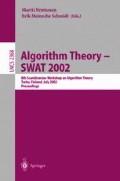Abstract
The paging problem is that of deciding which pages to keep in a cache of k pages to minimize the number of page faults for a two-level memory system. We consider efficient paging algorithms that require limited space and time on a unit-cost RAM with word size w. We present an implementation of the randomized marking algorithm of Fiat et al. that uses only k + o(k) bits of space while supporting page requests in O(1) worst-case time. In addition, we present a novel k-competitive deterministic algorithm called Surely Not Recently Used (SNRU) that approximates the Least Recently Used (LRU) algorithm. For any constant 1/k ≤ ε < 1/2, SNRU(∈) ensures that the ⌈(1/2 - ε)k⌉ most recently requested pages are in the cache, while using only O(1/ε) worst-case time per request and 2k + o(k) bits of space.
This research was supported in part by the IBM Toronto Centre for Advanced Studies.
Access this chapter
Tax calculation will be finalised at checkout
Purchases are for personal use only
Preview
Unable to display preview. Download preview PDF.
References
D. Achlioptas, M. Chrobak, and J. Noga. Competitive analysis of randomized paging algorithms. Theoretical Computer Science, 234:203–218, 2000.
A. Andersson. Faster deterministic sorting and searching in linear space. In Proceedings of the 37th Annual IEEE Symposium on Foundations of Computer Science, pages 135–141, 1996.
A. Andersson, T. Hagerup, S. Nilsson, and R. Raman. Sorting in linear time? In Proceedings of the 27th Annual ACM Symposium on the Theory of Computing, pages 427–436, 1995.
A. Borodin, S. Irani, P. Raghavan, and B. Schieber. Competitive paging with locality of reference. Journal of Computer and System Sciences, 50:244–258, 1995.
W. Effelsberg and T. Haerder. Principles of database buffer management. ACM Transactions on Database Systems, 9:560–595, 1984.
A. Fiat, R. M. Karp, M. Luby, L. A. McGeoch, D. D. Sleator, and N. E. Young. Competitive paging algorithms. Journal of Algorithms, 12:685–699, 1991.
A. Fiat and M. Mendel. Truly online paging with locality of reference (extended abstract). In Proceedings of the 38th Annual IEEE Symposium on Foundations of Computer Science, pages 326–335, 1997.
M. L. Fredman and D. E. Willard. Trans-dichotomous algorithms for minimumn spanning trees and shortest paths. Journal of Computer and System Sciences, 48:533–551, 1994.
S. Irani, A. R. Karlin, and S. Phillips. Strongly competitive algorithms for paging with locality of reference. SIAM Journal on Computing, 25:477–497, 1996.
A. R. Karlin, M. S. Manasse, L. Rudolph, and D. D. Sleator. Competitive snoopy caching. Algorithmica, 3:70–119, 1988.
A.R. Karlin, S. Phillips, and P. Raghavan. Markov paging. In Proceedings of the 33rd Annual IEEE Symposium on Foundations of Computer Science, pages 208–217, 1992.
T. W. Lai. Paging on a RAM with limited resources. Technical Report TR-74.187, IBM Toronto Laboratory, 2002. To appear.
C. Lund, S. Phillips, and N. Reingold. IP-paging and distributional paging. In Proceedings of the 35th Annual IEEE Symposium on Foundations of Computer Science, pages 424–435, 1994.
L. McGeoch and D. D. Sleator. A strongly competitive randomized paging algorithm. Journal of Algorithms, 6:816–825, 1991.
P. Raghavan and M. Snir. Memory versus randomization in on-line algorithms. IBM Journal of Research and Development, 38:683–707, 1994.
R. Raman, V. Raman, and S. S. Rao. Succinct dynamic data structures. In Proceeding of the 7th International Workshop on Algorithms and Data Structures, pages 426–437, 2001.
D. D. Sleator and R. E. Tarjan. Amortized efficiency of list update and paging rules. Communications of the ACM, 28:202–208, 1985.
N. Young. The k-server dual and loose competitiveness for paging. Algorithmica, 11:525–541, 1994.
Author information
Authors and Affiliations
Editor information
Editors and Affiliations
Rights and permissions
Copyright information
© 2002 Springer-Verlag Berlin Heidelberg
About this paper
Cite this paper
Lai, T.W. (2002). Paging on a RAM with Limited Resources. In: Penttonen, M., Schmidt, E.M. (eds) Algorithm Theory — SWAT 2002. SWAT 2002. Lecture Notes in Computer Science, vol 2368. Springer, Berlin, Heidelberg. https://doi.org/10.1007/3-540-45471-3_43
Download citation
DOI: https://doi.org/10.1007/3-540-45471-3_43
Published:
Publisher Name: Springer, Berlin, Heidelberg
Print ISBN: 978-3-540-43866-3
Online ISBN: 978-3-540-45471-7
eBook Packages: Springer Book Archive

